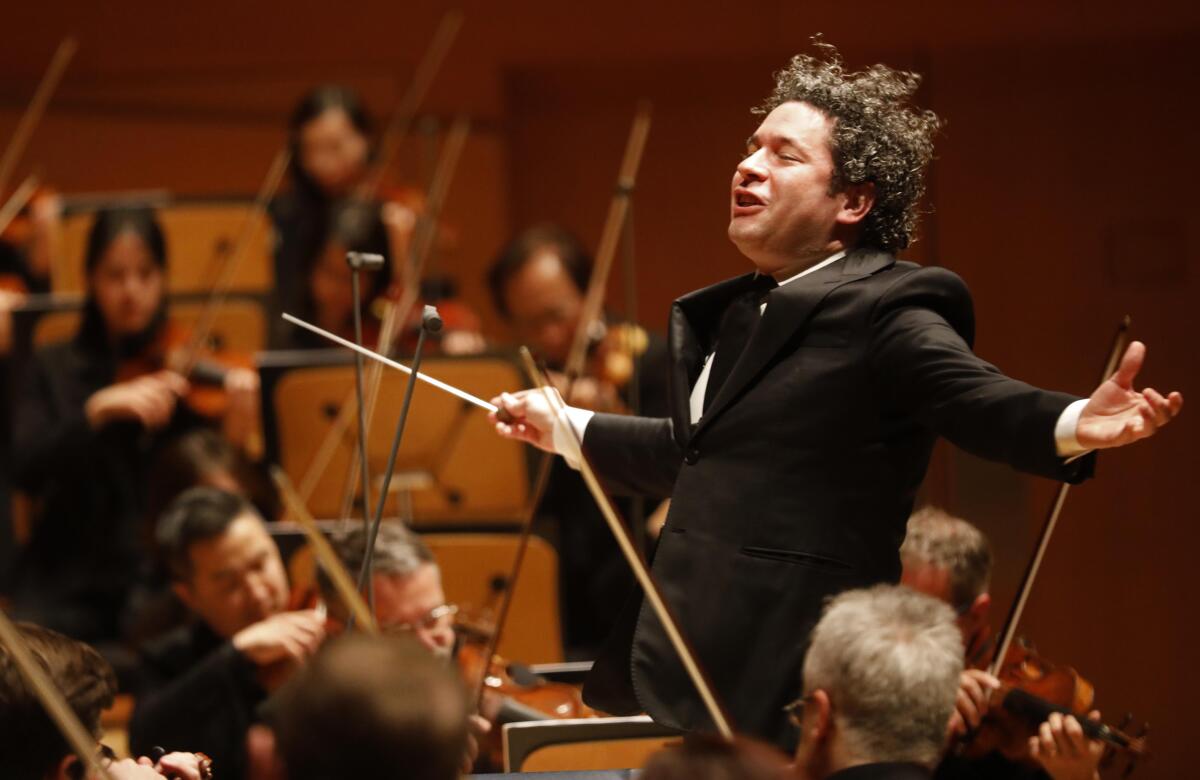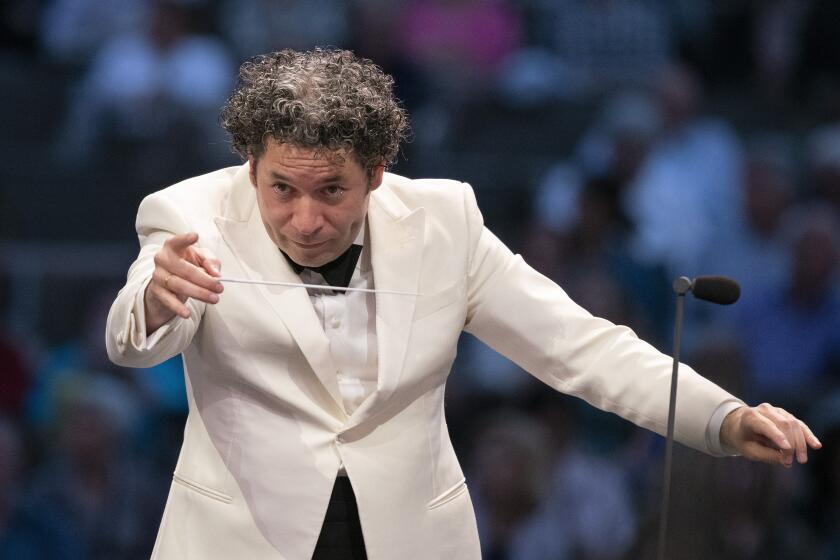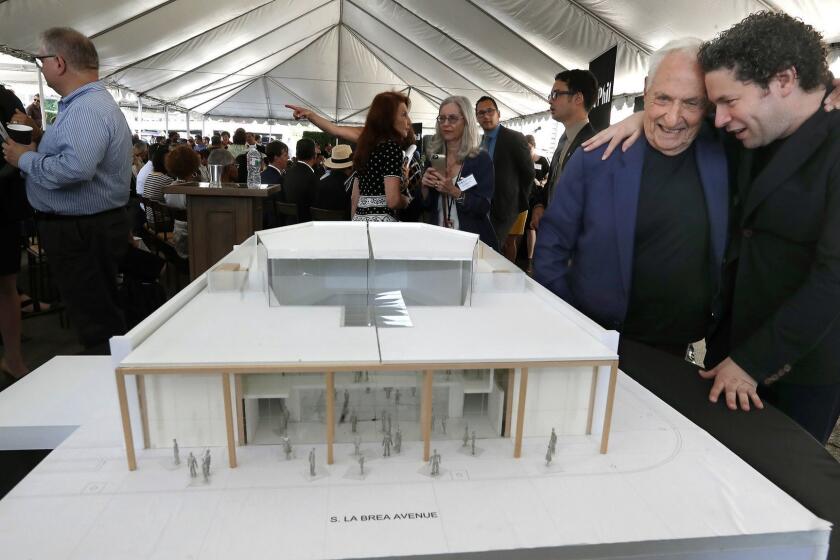Commentary: The New York Philharmonic hasn’t had a superstar in decades; now it’s getting Dudamel

In the 1970s, when asked about rumors that he might leave the Los Angeles Philharmonic and become music director of the New York Philharmonic, Zubin Mehta answered with another question: Why would he want to go to New York when he has the Rolls-Royce of an orchestra here? Shortly after, Mehta announced that he would be going to New York.
The allure of New York cannot be ignored. For some time now, New Yorkers have been convinced that Gustavo Dudamel would not succumb to the obvious advances the New York Philharmonic had been making since its current music director, Jaap van Zweden, announced he will be leaving at the end of the 2024 season. We in Los Angeles were just as convinced that Dudamel going to New York would be a step down. The advantages of Los Angeles greatly outweigh what the Big Apple has to offer.
We were wrong.

Subscribers get exclusive access to this story
We’re offering L.A. Times subscribers special access to our best journalism. Thank you for your support.
Explore more Subscriber Exclusive content.
In a phone call Tuesday morning, a jet-lagged Dudamel, just back from conducting “Tristan und Isolde” at the Paris Opera, where he is also music director, called the L.A. Phil the greatest orchestra in America, maybe the world. But he felt this was a turning point in his life. That he had accomplished much here and felt this was the time.
He said nothing about New York until I finally asked him whether he was going. He paused for a second, and sheepishly replied. “Yes.”
Gustavo Dudamel is set to leave the L.A. Phil at the end of his contract in 2026, when he will then take top post at the New York Philharmonic.
Dudamel’s decision to become music director of the New York Philharmonic in 2026, when his contract in L.A. expires, does, though, represent the power of New York. We should have known not to underestimate Deborah Borda, the former L.A. Phil head who brought Dudamel to Los Angeles in the first place and who is now the New York Philharmonic‘s chief executive.
Borda came to L.A. after leaving a flailing New York Philharmonic. We never thought she would go back. She left L.A. at a high point, as the town’s most impressive and visionary arts leader who went on to save an imploding New York Philharmonic. She did wonders in New York, including overseeing the newsmaking renovation of its unloved concert hall.
And now one of L.A.’s most important and beloved cultural figures will follow her lead. The New York Philharmonic is America’s oldest orchestra. Its history is that of legend. It is the orchestra of Mahler, Toscanini, Bernstein, Boulez. It doesn’t need saving, but it does need a Dudamel. No conductor since Bernstein in the 1950s and 1960s, and Pierre Boulez, in the 1970s, has made a significant impact (Mehta included). He remains an icon in L.A. and not in New York.
But just as much as New York may be a lure, the New York Philharmonic is obviously entranced by the L.A. orchestral glow. The L.A. Phil’s former music director, Esa-Pekka Salonen, just happens to be conducting the New York Philharmonic this week, just as he was in L.A. when the Dudamel announcement made history back in 2007. Coming up in the next weeks are L.A. Phil principal guest conductor Susanna Mälkki and native Angeleno and former L.A. Phil principal guest Michael Tilson Thomas. John Williams also has a date. And Dudamel conducts Mahler’s Ninth Symphony in May.
The loss of loved ones to the pandemic has given Gustavo Dudamel a fresh outlook on the L.A. Phil, his new post in Paris, and his life with his wife and son.
What Dudamel will give up is Walt Disney Concert Hall, an orchestra with the largest budget anywhere and an ambition to do newer and bigger things, more than anywhere else in the world. In L.A., he reaches a wider audience than any music director at a major orchestra anywhere. He has created a world of music education with Youth Orchestra Los Angeles, and he has architect Frank Gehry ready to build anything he wants, anywhere.
Dudamel has the Hollywood Bowl, where he made his historic U.S. debut and which he admits he will miss, although he expects to return to it and Disney regularly as a guest. He has an adoring audience. Composers would beg, borrow and steal to get new pieces played by Dudamel and the L.A. Phil if it weren’t for the fact they don’t have to — the orchestra commissions more new music than all the other major orchestras in American combined. Very connected to the film world and especially John Williams, he has Hollywood. He has the world of pop music at his fingertips here, also a passion of his. Crucially, he is a proud Venezuelan who serves a city with a majority Latino population.
Subscriber Exclusive Alert
If you're an L.A. Times subscriber, you can sign up to get alerts about early or entirely exclusive content.
You may occasionally receive promotional content from the Los Angeles Times.
What does New York have to offer? Mainly the legacy of the New York Philharmonic. It remains one of the world greatest and most celebrated orchestras. But it competes with all the world’s touring orchestras who come regularly to Carnegie Hall. The orchestra shares Lincoln Center with many other companies, and the center, itself, has been significantly lessening its once voluminous classical music offerings. Open-minded and young audiences are another L.A. Phil advantage.
Dudamel will change the orchestra, the mood in the hall and the range of music. Audiences will grow. The New York Philharmonic has a history of turning on its music directors, but reports are that the orchestra uncharacteristically erupted in cheers given the news at rehearsal Tuesday. When he is in town, Dudamel’s concerts will be hot tickets in a way they haven’t been for a New York Philharmonic music director in a long time. The orchestra will matter again. Dudamel doesn’t go anywhere without starting youth music programs, so New York can count on that.
With the Los Angeles Rams and Chargers’ forthcoming stadium certain to transform Inglewood, a $14.5-million renovation of an abandoned bank building a mile away may seem a smaller emblem of civic renewal.
But there will always be the enormous competition, not of only orchestras, but everything else going on. Dudamel will inevitably be a smaller fish in bigger pond. Borda will no longer be running the New York Philharmonic — this is her last season — and Lincoln Center is known for being a cutthroat institution. Dudamel is tough, though. He is convincing. He is a great conductor who keeps getting better. He is a great communicator.
If any cultural leader can make a difference in New York, he is the one. So, we need to take him seriously when he says that in order to grow, he needs new challenges.
The question is not whether Dudamel is ready for New York, but whether New York is ready for him.
More to Read
The biggest entertainment stories
Get our big stories about Hollywood, film, television, music, arts, culture and more right in your inbox as soon as they publish.
You may occasionally receive promotional content from the Los Angeles Times.













